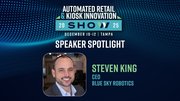News
Gen Z consumers love automation, Boomers not so much

Adobe Stock
April 11, 2023
When it comes to automating the retail customer experience Baby Boomers have a harsh view of the strategy but Gen Z consumers view it, and its impact, much more favorably.
Those are top findings from InRule Technology research that also revealed the following:
- When it came to positive attributes of automation within the CX, Gen Z sees the silver lining as 40% think automation helps yield stronger privacy and security measures through stricter compliance compared to 12% of Boomers.
- 41% of Gen Z think automation offers greater personalization (compared to 20% of Boomers) and 43% believe automation improves customer support through quicker responses or shorter wait times (compared to 28% of Boomers).
- 67% of Boomers think automation lessens human-to-human interaction (compared to 26% of Gen Z).
- 47% of Boomers find automation impersonal (versus 31% of Gen Z).
- Half of Boomers (50%) are very likely to prefer to interact with a human, even as technology continues to improve CX. However, that drops to a quarter (25%) with Gen Z.
- ChatGPT isn't trusted by most consumers — and even less with Boomers — which could be attributed to overwhelming preference of keeping a human in the loop.
- Most consumers don't think ChatGPT can be trusted as over half (59%) cited they distrust or fully distrust the chatbot technology.
- Nearly half (47%) of consumers don't enjoy or are uninterested in using chatbots like ChatGPT during the CX, as they prefer to talk to a human and feel the technology wouldn't understand. Notably, there is an interest gap amongst ages, especially when it comes to Boomers versus Gen Z.
- Nearly three-in-four Boomers (71%) don't enjoy or are uninterested in using ChatGPT, however, that number decreases to only a quarter (25%) with Gen Z.
- On the flip side, over half (58%) of Gen Z enjoy or are interested in using ChatGPT, but only 14% of Boomers are.
The online survey polled 1,000 U.S. adults ages 18 or older and was conducted by Dynata, a global market research firm, in February 2023.





